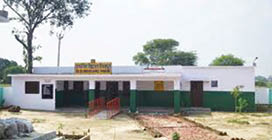Yogesh Sahu and Rajnish Bajpai have so far transformed 14 villages in Madhya Pradesh, Chhattisgarh, Uttar Pradesh and Maharashtra.
New Delhi: Two young IIT professionals set out on a mission in 2017 to change the face of villages in India and following the example of Prime Minister Narendra Modi, started their work to make villages in India “Smart”.
The duo Yogesh Sahu and Rajnish Bajpai selected the village of Taudhakpur, a small village in the Rae Bareli district of Uttar Pradesh to transform it from a medieval village to a modern Smart Village. Within six months, their mission of “Smart Gaon” was accomplished as the two toiled through months to achieve the remarkable success in a very short span of time.

As part of the “Smart Gaon” project, Yogesh and Rajnish drew a plan to develop the village in various aspects, starting from smart schools with clean drinking water and toilets, smart classrooms, to cleanliness, tree plantation, beautification, electricity connection and clean drinking water to each household, healthcare, to waste recycling, better road connectivity, toilets, internet zones, Skill development of youths, among such other things.
According to Yogesh Sahu, who spoke to The Sunday Guardian, as per the mission of Prime Minister Modi they first took up the project of making the village Open Defecation Free (ODF) in the shortest time possible. In 48 hours, Yogesh and his team constructed 243 toilets in the Taudhakpur village, creating not only a national record, but also a world record for fastest toilet construction activity in the world. Their efforts in the transformation of the village were recognised by the Prime Minister in his 48th edition of Mann Ki Baat that was telecasted in July 2018 and since then Yogesh Sahu said that his mission for the project “Smart Gaon” was solidified and gave a boost to his dream of creating more than 100 “Smart Gaon” across the country by 2025.
Speaking to The Sunday Guardian, Yogesh Sahu said, “We never expected the Prime Minister to notice our work and mention it in his Mann ki Baat. But when this happened, I was in Chhattisgarh, working on another village to transform it into a Smart Goan. I had no access to the television then and asked my wife to see what is happening. It took some time to sink in that none other than the PM himself applauded us for something which we were doing out of our passion. This emboldened us and gave us the much-needed impetus to work selflessly for the poor and for the villages of India.”
“Since then, we formalised the Smart Goan mission and onboarded a lot of professionals from across the spectrum that work on planning, healthcare, construction, amongst other such fields,” Yogesh added. Asked who has been funding their project, Yogesh said, “We have not raised any funds till date and we have bootstrapped to complete this mission. We now have 100 villages that we will be transforming in the coming two years. Some of which are in Madhya Pradesh, Chhattisgarh, Uttar Pradesh and Maharashtra.”
Yogesh and Rajnish have so far transformed 14 villages in Madhya Pradesh, Chhattisgarh, Uttar Pradesh and Maharashtra. “We formalised a platform called Smart Gaon Development Foundation and have people from various countries like Sweden, Germany who are supporting us. We now have 43 experts in our board who help us achieve our mission. It generally takes around 1 year to 1.5 year to complete the process and we are working towards bringing down this time to six months.” Yogesh told this newspaper.
Yogesh comes from a humble background as his father worked as a daily wage labourer in Bhopal, Kolkata and parts of Bihar. He said his childhood was spent in slums and small villages and after he reached college and then IIT Bombay, he realised how life can be different. He also said that his story of rising from the slum to currently working in large company transformed his vision to change the lives of people who are in the villages and provide them with advanced and most important facilities in the villages itself.

